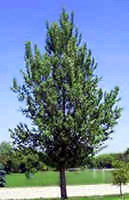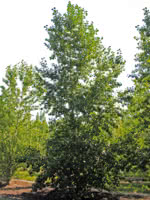Mon-Fri 9am - 5pm Mountain time
Hill Poplar vs Tristis Poplar
Populus x Hill
Populus x Tristis
CUSTOM GROW
NOT AVAILABLE THIS SEASON - MIGHT RETURN
Hill Poplar is a hardy, fast-growing tree with a narrow crown. Hill Poplars function well as a privacy screen or windbreak.
This attractive, long-lived shade tree is a great choice for home and commercial consumers alike, as it requires little pruning or maintenance care.
Hill Poplar has largely been replaced by more desirable hybrid poplar varieties that are more resistant to disease.
Tristis Poplar is a large deciduous tree. It is cold hardy, disease resistant, and relatively drought tolerant. Tristis Poplar loses its leaves later in the year than other Poplars, making it a great ornamental tree in fall.
It's known for its strongly scented balsamic buds and yellow foliage in autumn. Because of its size, Tristis Poplar is most suitable for large properties and will help prevent wind erosion.
Tristis Poplar is slower-growing than many newer hybrids, for a longer useful lifespan. Tristis grows especially well in the southern prairies due to its resistance to cold dry winds.
Hill Poplar Quick Facts
Tristis Poplar Quick Facts
In row spacing: 2.4 m (8 ft)
In row spacing: 2.4 m (8 ft)

